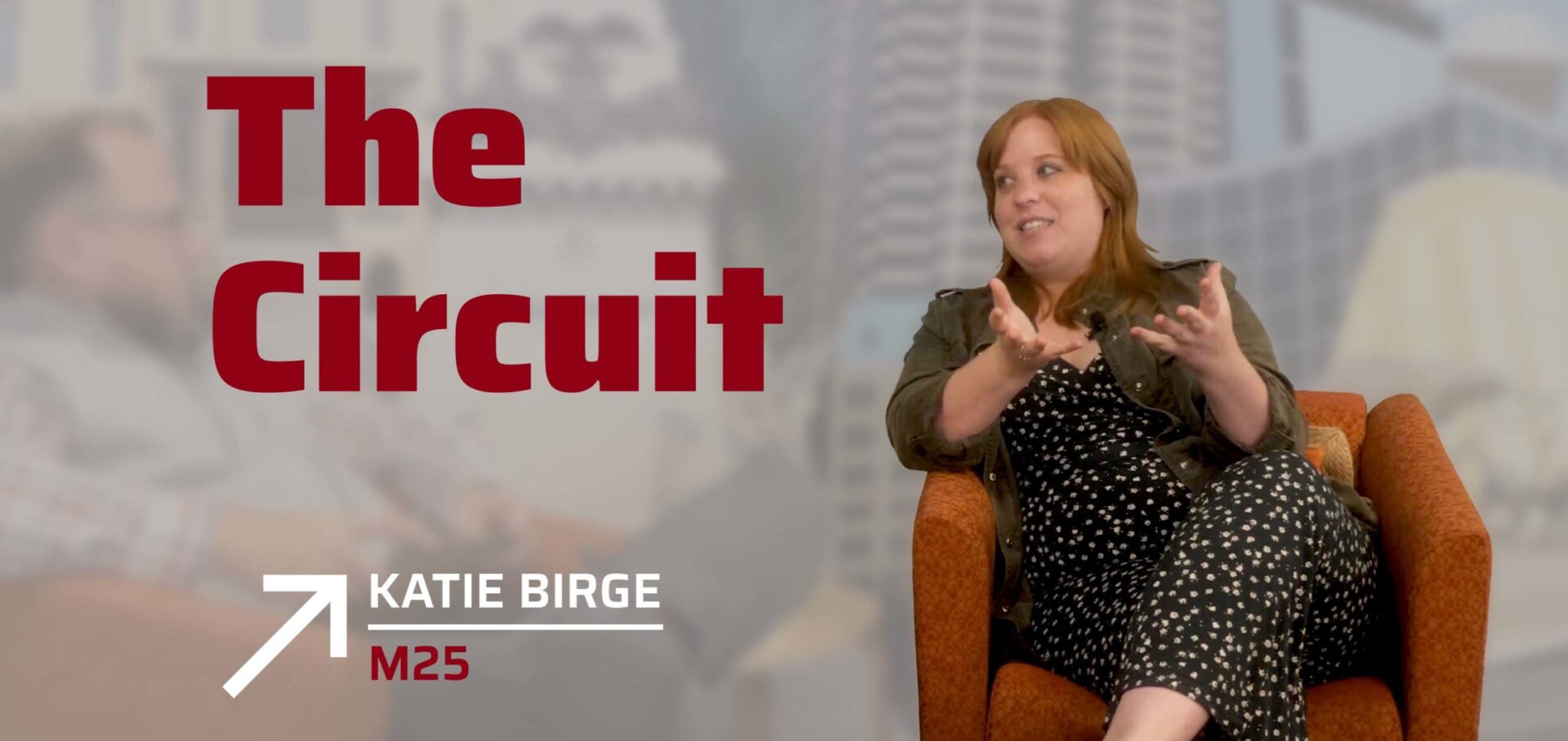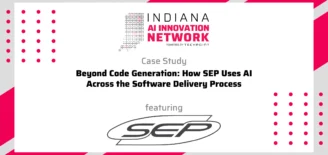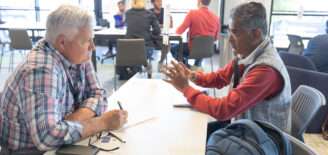Katie Birge | M25: The DNA of a Top Midwest Startup City
Today we talk to Katie Birge, associate and head of platform at M25. M25 is an early-stage venture firm based in Chicago that invests solely in tech startups based in the Midwest with many Indiana companies in their portfolio. In this episode we talk about Katie’s journey to working in venture capital, what criteria M25 looks for when investing in a startup, and what circumstances led to Indianapolis being ranked the number three midwest startup city.
Katie’s Journey from Copy Editing to Venture Capital.
Roger Shuman
Well, Katie, thanks for being here.
Katie Birge
Yeah, absolutely.
Roger Shuman
So I wanna jump into the first thing that interested me, and this is sort of has a, I guess a, it’s selfish self-serving. Your journey from junior copy editor to, M25. my first title as a, even while I was still in college was junior copywriter, and now I, I’m sort of in the VC world too. So tell me a little bit about that. What did you learn along the way that took you to M25?
Katie Birge
I’ve learned what I learned along the way. yeah, I, so similar to you, first internship in college was a junior copy editing role. I thought I wanted to work in media, I thought I wanted to write articles, interview people. I landed an internship at a kind of startup media agency in Munich. I was their very first intern. They actually had like Indiana and DePauw, which is how I found them. And what I learned in that six months is that I hated copying, and I did not wanna be a writer. So, real, I think it’s, I think it’s really great to also learn what you don’t want to do along the way. so did that, as my first role. And then, I don’t know, Roger, if you and I have ever talked about this, but I went to grad school at IU during the recession when they told you not to apply to grad school just because you couldn’t find jobs.
Katie Birge
That’s exactly what I did. <laugh>, in the telecommunications program at IU which is essentially like new media origins of the information, age, creative economies, not like phone service providers like you think telecom, although, like, honestly, we did get into the bare bones of that as well. Yeah. so really got to like early learn about startups and VC to some degree during part of those courses. left grad school three years later to intern at SproutBox in Bloomington, like very early venture studio. Did tech focused economic development work in Bloomington for several years. A brief stint doing marketing for a startup there. And then, meandered my way up to Indianapolis to work at LaunchIndy, running the co- working space there, open an accelerator for social enterprises during my time there. And, really knew that what I wanted to focus on next in the future was venture to me.
Katie Birge
Like that was the next logical step in my career, given the work I’ve been doing, supporting startups, and working in tech ecosystems. And, the opportunity to work for M25 kind of just, fell into my lap. Luckily, I, my, my latest work in grad school was looking at the rise and fall of the industrial Midwest and how can we turn factory towns in the tech hubs. And, so obviously everything I’ve gotten to do since then has been along those lines and had the opportunity to work for a Midwest focus VC firm. Just incredible. So, that’s how, that’s how I got here, the long and winding road. But, again, one of the most important things in my career was learning that I did not want to be a writer <laugh>.
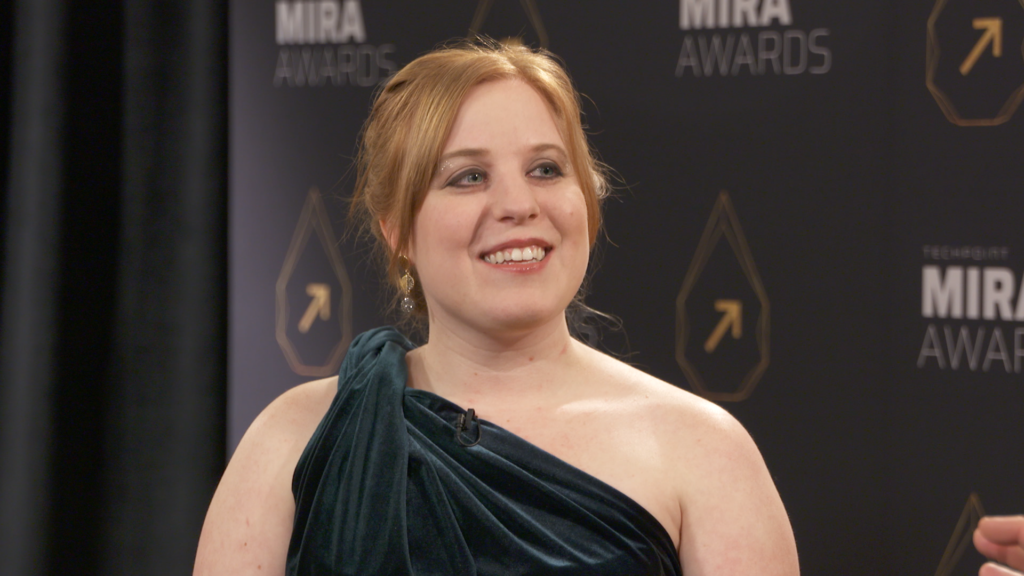
Platform’s Role in Venture Capital.
Roger Shuman
Yep. I can relate. I won’t get into it, not my interview, but, so your title today, I believe is head of platform at M25. So I talk to a lot of venture capital firms, investors in general. It’s a title I see occasionally, but not too often. Tell me a little bit about what that means and maybe you can explain a little bit about the rise of platform in venture capital.
Katie Birge
I’d be so happy to, and for anyone that’s interested, there’s actually a global VC platform community. if you just, you know, if you Google VC platform, it will be the first thing that shows up. It’s a network of over 1400 people in platform roles, a venture capital firms from across the country. And it started just a few years ago with a few people grabbing beers in New York and talking about their very specific jobs that were, you know, sometimes with the investment team, I sit on our investment team as well, but like most of what I do is directly supporting the startups we already have. And so they started meeting together, figuring out what overlaps that were and rules what platform is and isn’t. And so that’s kind of, I was like the early origins of talking about platform roles of VC firms.
Katie Birge
Essentially, while it varies wildly, right, depending on the firm, the firm’s size, what their focus is, platform broadly is supporting your existing portfolio, however you can, I always like to think, think of it, as falling into like five or six categories. So your people who work on talent and recruiting for your, for your portfolio companies. If you have someone on your team doing that kind of being the first recruiter for startups, it could be doing marketing and branding for those companies or for your firm, community management, traditional portfolio support. Big companies like Google want startups early so they can keep them for life once they’re like already in the system. Yeah. So, they’ll offer perks and discounts to startups, managing all of those perks and discounts falls under platform. sometimes business development does, it’s something we’re not that focused on.
Katie Birge
But sometimes the big teams will have like three or four biz dev people in their platform team to support those startups, early business development, and like go to market strategies, et cetera. Sometimes platform roles can be investor relations. A lot of them have event components to it. so really just anything that your firm is doing other than investment would fall under, platform. I also like to think of it as like, what platform of support are you offering your companies? and again, it’s super different depending on the firm and what their goals are, but, that’s, that’s how I define it.
M25’s Place in the Venture Capital Landscape.
Roger Shuman
Yep. No, that makes sense. So now all investors that I meet brand themselves as being value added investors. So how does a typical founder go about discerning the difference between, or the difference in the right fit? I mean and conversely, how does a VC stand out in the crowd as a differentiated investor?
Katie Birge
Yeah. I think there are a couple important things that I talk to startups about when, even when I’m having intro calls with them and we’re considering investment, I think it’s super important if you, if you’re in a very like niche industry to know who the experts are. See firm-wise, like, just as an example. I think robots are really cool. I don’t know anything about robots. I think collectively as a firm, robots would be a very hard, area for us to focus on. But there are VC firms Sure. you know, dozens of VC firms that are just focused on robotics. Right? So the level of expertise that those people bring, whether it’s being past operators at a robotics company, whether it’s being like a mechanical engineer that’s just a robots expert, I don’t know why I went specifically with robots, but I do get excited about them, so that’s fine.
Katie Birge
But, you know, having a very specific industry focus, that’s one thing that might be important depending on the type of company. I think it’s super important when a startup is asking, is, is is asking for funding from an investor to also be interviewing that investor to see what types of support they can offer. One thing that I always like to tout at M25, what types of support we can offer. Well, we do an annual event where we bring 200 investors in Chicago to meet with our portfolio companies. And we generally book between 500 and 700 double opt-in meetings, over those two days. We actually just had ours last week and it was over 800, which is bananas Yeah. For two days, but…
Roger Shuman
Congratulations.
Katie Birge
Thank you. but with the goal of several millions of dollars being raised. In the course of those two days, not immediately, but Sure. You know, in the, in the upcoming months, because we know that we’re not going to be a later stage investor. So for us, the biggest way we can provide value is making those intros to likely next investors. I think that’s super important. One thing we also try to do, that are just small things, webinars, we’ve done some mental health and wellness stuff, especially early on in the pandemic. we tried doing a science of wellbeing and happiness class, the one of the Ivy League schools offering as a online virtual kind of asynchronous class. We also tried having a gaming league during like, the most stressful part of that summer of the pandemic and those are things that aren’t important to all founders, but, I think that’s something, I think talent is super on top of everyone’s mind right now.
Katie Birge
And like, even though some huge tech companies are starting to announce layoffs, there’s still such a war for talent. So, I always recommend that if startups are interviewing investors as much as investors are interviewing them for potential investment, knowing what they can offer in terms of that. Yeah. there are some firms that have whole dedicated talent teams of like actual professional recruiters. I am not an actual professional recruiter <laugh>, but I am doing a lot of recruiting work for companies. but I think it’s super important to know, and then as you’re filling out an investment round, you can know what specific firms are offering, which benefits, and if there are any gaps, so that if something like talent is really important to you and you’re choosing between a couple of firms for rounding out that round, that could be the deciding factor. So yeah. I think, you know, I think firms are always hoping they can provide more value. That’s something that we take really seriously. But, yeah, I do think every investor thinks of themselves as a value add. Sure. And one thing we’re always trying to do and platform teams are trying to do is figure out how to actually contribute that value.
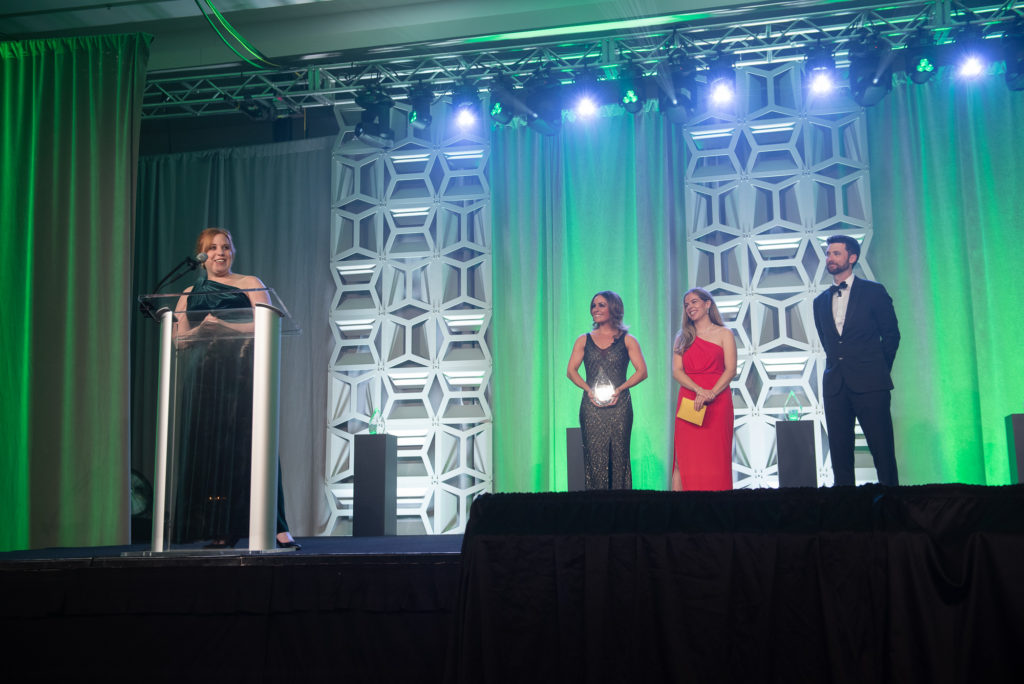
M25’s Portfolio.
Roger Shuman
Yeah. So thinking about adding value platform and just the size of your portfolio, how are you able to do that to provide value to like at least 60 companies?
Katie Birge
We have 131.
Roger Shuman
Okay. So I was only like half off <laugh>.
Katie Birge
I mean, some of it is just that it is a, it’s, it’s, it’s crazy sometimes working for a firm that has that many portfolio companies. I think one thing we’ve really prioritized at M25 and and me in this role has been trying to strategize what, what our limitations are, given that we’re currently a platform team of one with some additional support from the rest of team. But the rest of the team very much focused on, investment or, or like office operations mm-hmm. <affirmative>. so figuring out like what are our priority areas? I spent the last two weeks of December last year really outlining how I thought M25 should prioritize our platform support. And for me, like it’s five areas, It’s talent, it’s events like what we’re already doing with our summits. We also do super fun, happy hours in Midwest cities where we have more than three or so companies. So planning those, doing our own team marketing and brand. because the more we can get out there, the more that helps with our deal flow. So that’s an area that I’m focused on that not all venture firms have a priority focus, community management through our Midwest startups brand. if you go to midwest startups.com, we have tons of content on, open roles, but also what’s happening in terms of new investment rounds in the Midwest, new DC funds in the Midwest.
Katie Birge
So managing that brand and then, and then talent, like those are really the areas that I like to focus on. because I think that, you know, again, there are whole, there are larger teams at larger firms that can have a person dedicated each of that. Right. But knowing for us, knowing what our limitations are, given our size of fund and our size of team, what are tangible things we can do in those five areas. Right. and, and how can we just go about doing the best we can with those? we’re a very OKR driven organization, so, one thing that we’ve tried to do is prioritize in each of those categories, a couple of metrics every quarter that we can try to hit. And then the idea is like, hopefully we’ll figure out new efficiencies and processes and we can just keep growing the goals as we go.
Roger Shuman
And I mean, on top of that, you know, you mentioned you’re the only person who’s focusing on platform, but your team of what about seven people?
Katie Birge
Yeah. We have, we actually have eight people. Okay. Now, every, sometimes we have an intern, We currently have a platform intern, which has been incredible. Cool. but yeah, I, it is tough. I think that everyone on the team works really hard. We all, we try to rely on tech stacks and platforms to streamline a lot of our processes. but yeah, I, I think for us, communication is key. We actually do, a lot of VC firms have a weekly pipeline meeting. We have two, so that we can all be on the same page about flow of investments and, who needs to follow up with who, when we also set really strict metrics for turnaround times on things like making an investment decision or getting back with, potential investments mm-hmm. <affirmative>. And I think holding ourselves accountable to that also lets us function really well as a smaller team.
Midwest Entrepreneurs.
Roger Shuman
Yep. Sure. So as an investor seeking opportunities in more than 10 states, are there common characteristics among who’s your entrepreneurs that you talk to that maybe set them apart from some of their counterparts?
Katie Birge
Oh, that’s a great question. well, I would say like a couple of obvious things as, you know, as everyone knows, having ExactTarget bought by Salesforce, in 2013 really did a lot to change the face of investing in Indiana. And also the flywheel effect from people leaving there to start either venture firms or companies. I think that a lot of the marketing tech is still concentrated here. Relative to other parts of the Midwest. I think that, so I think that’s like an obvious thing. I think, one exciting thing for me has been to see, an increase of accelerator programs Yes. That’s spitting out. Yeah. as you know, long time fan of the GBeta program over here. But, it’s been really great to see, you know, very topic specific cohorts during the graduate in Indiana, having the TechStars program, both the hardtech one for a couple years and sportstech one still up and running has been really great to see. And I know that in those cases, especially, they’re not always located in the Midwest. Right. while they’re visiting here for the accelerator, but I still think that those kinds of interactions that they’re having with entrepreneurs while they’re here is creating some really interesting cross-pollination of ideas. and I think that’s something that not a lot of ecosystems have. I think also this, this isn’t about entrepreneurs specifically, but the fact that we have a state run fund of funds right.
Roger Shuman
Next level fund.
Katie Birge
Yeah. Is something that’s becoming more popular and we are seeing more often. But I do think that Indiana, at least relative to the Midwest, was one of the early pioneers Yeah. Of a fund of funds. And I do think that we’re finally starting to see some really exciting, traction because of it. Yeah. I think that when, when it first launched, we were seeing, you know, a handful of investors from the coast taking an interest in Indiana, but I think that the pandemic, the crazy priced rounds that were happening last year on the coasts and, people’s willingness to do things virtually those things coupled with having a fund of funds has really brought new interest. Yeah. And some really exciting to investors to Indiana.
Roger Shuman
Yep. Totally agree. so M25 has a broad investment thesis. Yeah. so how does that compare to, you know, if you’re, if you’re a founder, you, you might be maybe you’re seeking out a fund with deep domain expertise…
Katie Birge
…like robots.
Roger Shuman
Like robots, <laughs>, I mean, and have you invested in any companies that are doing robotics? You’re pretty active in Pittsburgh’s.
Katie Birge
Funny, it’s funny that you ask that because, I, my initial response was no, but we did have an early investment, I believe fund one that was a, like robotic cat toy. So there you go. So, you know, like kind of, I so largely, so largely we, we are generalists. Yeah. There are any heavily, heavily regulated industries typically we don’t do because we don’t have that depth of regulatory knowledge. So for us, that’s vice-industries pharmaceuticals. Biotech, gene editing, agtech, which you know, is like a hot topic here. I think one of the Gbeta ag, bioscience cohorts last year and the year before was all mm-hmm. <affirmative>, like very regulated tech like that. We just don’t, we don’t have a team size or a specific domain expertise that would make us comfortable with those investments.
Katie Birge
And a lot of biotech pharmaceutical investments are really big seed rounds up front for their generating revenue, and that’s really not what we’re into. so I would say like for us as a firm, we are generalists, but we also know what lanes we won’t play in because of that. Right. I do think we still lean very heavily into B2B SaaS. Sure. that won’t surprise you given that that’s, it’s hot here. It’s hot elsewhere in the Midwest. Yeah. and we have a few consumer products, but really, it has to be something that we think we can actually be useful in providing expertise or connections, for us to feel comfortable doing it.

A City with a Bit of SaaS.
Roger Shuman
Is Indiana or just maybe central Indiana in general, Just when you, when you look at so many different ecosystems that you’re dealing with in 10 states are more, are we really that strong in B2B SaaS compared to other areas?
Katie Birge
I think it depends on the sub domains. So we already talked about marketing tech being very hot here, and I think that, you know, even though it’s been so far removed from the ExactTarget position, we’re still seeing flywheel stuff from that. We’re still seeing startups spun up from current High Alpha people. Ex-High Alpha people. Like that’s all the same family of expertise. I would say, just as an example, there are tons of insurance tech companies in Ohio.
Roger Shuman
Right. Makes sense in Columbus.
Katie Birge
And then, you know, we, we see more, I usually see more Ag Tech software deals else in, in other farm, let’s call ’em farming states. Yeah. in the Midwest. we also see man, like this is probably overgeneralizing, but, you know, Chicago because they have so many larger tech companies that are like, I don’t know, let’s call ’em in this consumer space like group.
Roger Shuman
Sure. Yeah. Right.
Katie Birge
We’re seeing spinoff companies in like eCommerce out of the Chicago area. But I don’t know, I it’s not Indianapolis is still special because of marketing tech. I don’t think that we’re exclusively marketing tech, right?
Roger Shuman
We, it’s been a while actually since we’ve done an Indianapolis based investment. I think it was, like late December, 2020 or early January, 2021 and it was tra so cybersecurity. Yeah. I would say that M 20 fives Indiana based portfolio is not, it’s not that marketing tech heavy. Yeah. but I don’t know.
The Team at M25.
Roger Shuman
So I wanna talk about the age of M25 people. Yes. I’ve met quite a few of you. I think we, we’ve established that you’re what th not you personally. And we’re not gonna talk about how old anybody is in this room. <laugh>, but in general, 36 and under?
Katie Birge
Yeah. All big gaps there. I, we have this conversation a lot as a firm. We had several people in the last two years approaching 30, like how can we get in like the Forbes 30 under 30. Do as big a push as possible right before these people turn 30. We, we do skew really young. and it’s something that, it’s something that like, is, is great and I don’t even wanna call it limiting cause I also think we’re surrounded by really good advisors and mentors as well. we also have a surprising amount of prior work experience despite our age collectively with the team. we’ve already talked about my career trajectory. One of the founding partners actually very similar background to me he was, he was up at Purdue Foundry. Prior, did a stint at like a chemical engineering company for a while, has some experiences as an operator because of that. he and I actually, before we knew each other, were running the Lafayette and Bloomington branches of Verge back in the day, respectively at the same time. So like the first two outside of Indianapolis. he and I were separately like running those events.
Roger Shuman
This is Powderkeg when it was called The Verge?
Katie Birge
Exactly. So, you know, similar background to me, Victor on our team, founding partner had prior experience at Walgreen’s corporate. Claire’s corporate. So I always ask him if he could pierce my ears, and he always says no, he wasn’t trained in that. But I just keep asking.
Roger Shuman
<laughs> It’s not part of the corporate training?
Katie Birge
It can be part of the corporate training, but in his case he wasn’t. And then we’ve got a couple people who’ve spent their whole careers working in VC or adjacent to VC as well. So it’s a really exciting team. Can’t say enough about them, but, I love that we’re young. I think that we, when we do events, I think that they end later <laughs> then a lot of them do in the industry, but yeah. I think that, I think that, you know, there’s a lot to be said about, about age and expertise, but at the same time there’s a lot to be said about a band of smart young people, trying things out and also just like really working hard.
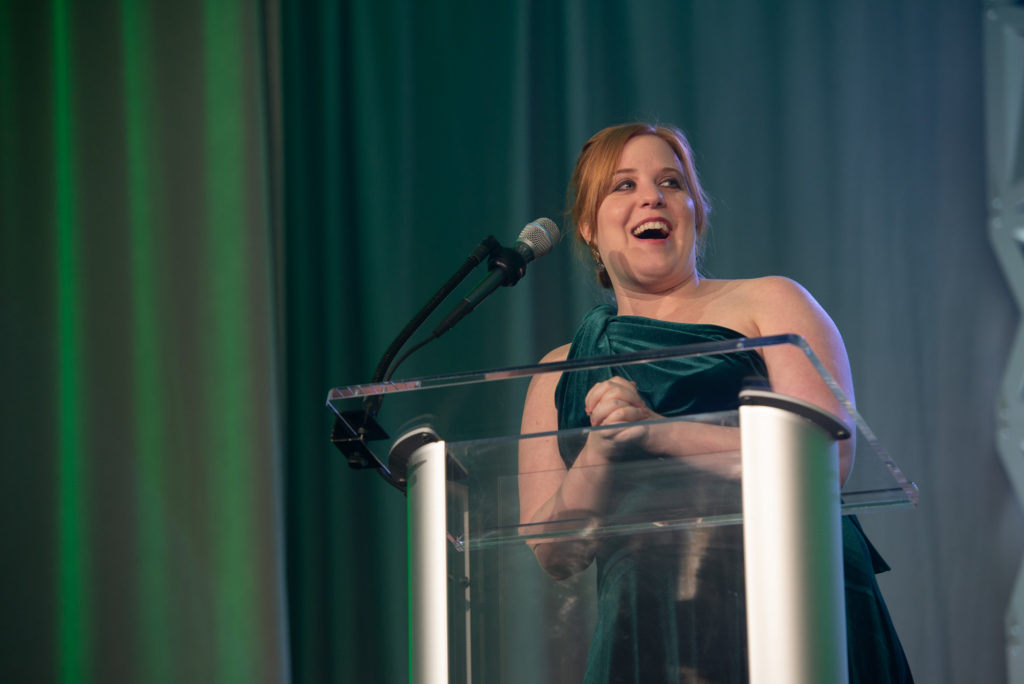
The Do’s and Don’ts of Pitching.
Roger Shuman
Now I know that you don’t, well, I don’t think that you daily talk to potential or… to founders. I mean, you have different folks in your organization to do that, but you do, you came to VC Speed Dating?
Katie Birge
I did, yeah.
Roger Shuman
But are there some like just absolute no-nos that entrepreneurs do that can be avoided?
Katie Birge
Yes. and a lot of this you’ve probably heard before, on occasion we’ll get a founder who wants us to sign an NDA. Venture firms don’t like to do that. It’s complicated. It might put them in a tricky spot where they don’t realize that there’s a conflict of interest prior from an existing investment or something like that. It’s not because anyone wants to steal your idea, it’s because VC firms don’t want that liability and don’t have the time.
Roger Shuman
I get that too. Like if I get someone wants to send me a pitch deck. Every once in a while someone will say, you gotta sign an NDA. I’m like, I’m sorry, I can’t sign an NDA. I always tell ’em to send me something that I can send to anyone else on the planet.
Katie Birge
Yeah, exactly. And I think that’s hard for some founders to hear because they’ve like spent so much time on this, this is their baby. Right. But I always just tell people, listen, like no one that you’re gonna be sending this to has enough time to copy your idea. Like, they don’t, So, generally NDAs are a nonstarter. I always recommend we get a lot of cold emails and we as a firm actually love cold emails are all kinds of Twitter debates on like cold versus warm intros. Our goal is to see every deal in the us we don’t care how we get it. We invested in companies that cold emailed us before. But it’s really helpful if a company can, make it clear where they’re from in an executive summary or email in like something that could be read in 30 seconds. Like where you’re from, what is your product, what size round are you raising? Just because we’ll get, you know, dozens of emails a week that are disqualifying either. Like we’ll see a dozens of emails a week that are disqualifying. It’s like, I’ve been researching M25 and I think you’re the most perfect fit for us, and it’ll be like a New York-based company using $5 million. And I’m like, nothing…
Roger Shuman
<laugh> Yes.
Katie Birge
Nothing about it is actually a good fit. Right. Thank you for making us read this. But I would say like just having, having a good idea of what a firm that your emailing is looking for, and I know that, I know that startups are busy. A lot of cold outreach is just like mass emailing and hoping for the best. Yeah. but trying to just curate that list a little bit so you’re also not wasting your own time. our friends at Bread and Butter Ventures in Minneapolis have actually done a couple of really great posts about how to do a cold intro, that I highly recommend any startups that are, that are reaching out cold. you know, we don’t, M25 definitely like cares deeply about diversity of our portfolio and I know that, anytime you’re trying to create a more equitable venture society, you cannot rely on warm intros. So we really rely on, on cold intros as much as we do more ones, but we, it has to be something we’ll invest in.
M25’s Midwest Startup Cities Rankings.
Roger Shuman
That just seems like the opposite of what you would hear the importance of a cold intro Yeah. Versus a warm intro. Yeah. So tell me about M25 Midwest Cities rankings. So, this is interesting to us right now. First off, how did it get started and what kind of reaction do you get from the cities?
Katie Birge
Yes. So I don’t know the like full origin story, but I can tell you that at M25 we are like nerds about data or nerds about Midwest and the Midwest Cities rankings is the perfect combination of those. So annually we collect, I think it’s between like 25 and 30 data points on 59 Midwest cities. And that number has grown a little to the original rankings. And then everything is weighted. It’s super complicated. I’m not on the number crunching side. but we ultimately compile all of the data from the past year. And it could be things like, what’s your state or city’s business tax climate like is it an attractive city for people to live based on these metrics? Is there really good broadband, like a very minor detail in those rankings, but still something, something that could affect it. and then what types of exits happened in the last year? What kinds of, like VC fund raises happen? How many accelerators are there in your city? so all of those factors we compile into a definitive ranking of cities. so it started, I think we’re, I think we’re on the fifth year, maybe the sixth year.
Roger Shuman
Sounds about right.
Katie Birge
I could be way off on that, but I believe so. And we always launched them in the late summer, early fall. It was, it was early August this year, so we’ve had about a month of it. One thing I’ve tried to do more in recent years is try to get, press, to reserve time on Victor’s calendar because Victor knows more than anyone. What’s going on in each city and why he thinks city’s moved up in rankings, anecdotally. So we’re trying to make it a big media affair. And it has grown in readership and interest over the years as well.
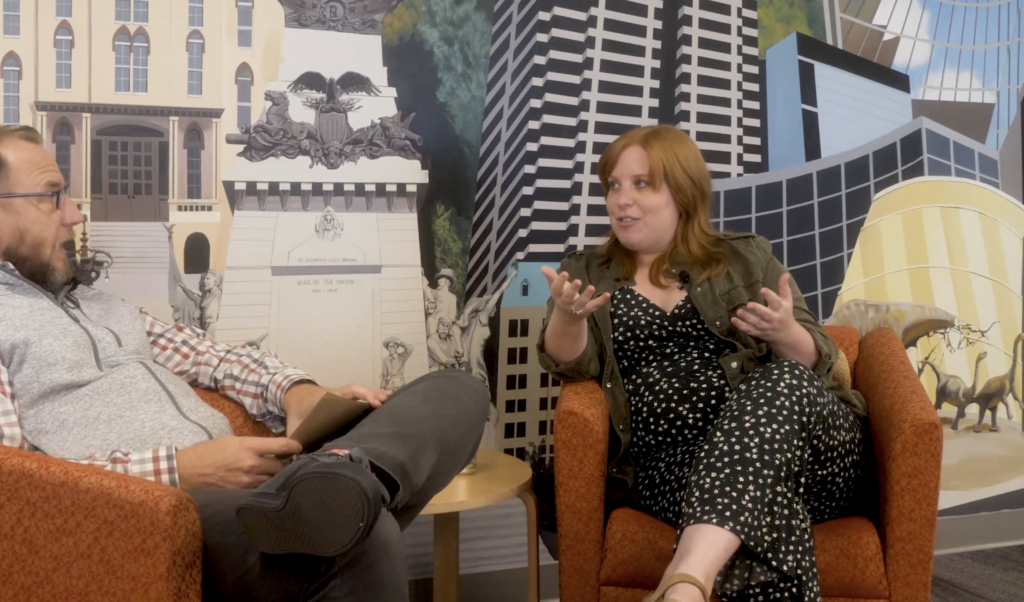
Indianapolis’s Journey to Top 3.
Roger Shuman
I can tell you from my notes, it started I think in 2017. So we’re looking about seven years or so. Six or seven years. Yeah. because Indy or Indianapolis debuted at number eight and 2017, we went to five a year later, and then we hovered at the number four spot for quite a few years for a very long time until finally breaking through to number three this year. We jumped above Pittsburgh. So, while your firm is based in Chicago, you’re right here in Indianapolis, what do you attribute to our growth from four to three or maybe even just from, eight to three today?
Katie Birge
Yes. So I, so some of the early rankings, I will say, like heavily factored in like pharmaceuticals and life sciences and patents.
Roger Shuman
Right.
Katie Birge
And so I think some of that, like…
Roger Shuman
Lean less on that today.
Katie Birge
…yeah. So it took us a while to figure out the weight of the rankings and like, is this an accurate reflection of what’s going on? We also like super welcome feedback. Every year we get like three to five people from different metros that are upset about something in the rankings and we listen to it and we consider it for when we’re tweaking the rankings next year. if I’m being honest, Indianapolis was a surprise to me this year. but I think some of that is just, again, like it’s been, it’s been a couple years since, well, not a couple years, but it’s been at least a year and a half since M25 did an investment in Indianapolis.
Katie Birge
And so, I was, I was actually thinking, because St. Louis has had a lot of, small, like small rounds, but lots of rounds in the last year, I was actually worried about us losing the number four spot to St. Louis. And I do not participate in the number crunching part of the rankings at all. And I always, I was also forced them to tell me as late as possible so that I can be surprised. And I, and in talking to the team about it, cause I did ask the number of crunchers why Indianapolis moved up and some of it is we’re continuing to have a robust accelerator ecosystem here. You know, whether one could argue whether that’s like weighted properly or not but I think that, I think that there are far more accelerators here than in Pittsburgh, for example. I think that Pittsburgh didn’t have as many large funding announcements. So if you recall last year’s big announcements. I’m having a hard time coming up with all of them on the fly. But, you know, Scale Computing did another big raise last year.
Roger Shuman
Yeah. Oh, we had a hundred million, 120 million rounds.
Katie Birge
Exactly. Yeah. Mega rounds. You write a newsletter. Yeah, so all of those large rounds, huge contribution. And then we also had a few new VC funds announced. So I think that momentum is great. One thing that I love about the rankings is when city officials or organizations like TechPoint will reach out and say, Hey, like, we saw that the rankings went well or we saw that rankings went not so well this year. We like to turn these results into actionable steps for our community. What hurt us or like what really helped us this year so that we can take that back to city officials and state officials when we’re trying, trying to add more resources to our arsenal. Yeah. and that’s something really cool that’s happened. I also love a good success story. Like Wichita moved up a bunch in the rankings this year and the like Wichita Chamber of Commerce was all over it on Twitter. I love one smaller local papers. We’ll cover that when a state cracks the top 25. My ultimate dream for the Midwest Cities rankings is to have something akin to like Selection Sunday for the NCAA tournament <laugh>, where we do like a live broadcast announcing the rankings one by one. I think we need like a full fledged production team for that. We don’t have…
Roger Shuman
We should have like cameras set up in remote areas so we could all just be sitting here.
Katie Birge
I’ll steal these cameras After this done. Yeah. And exactly just like, just when like what a school is selected…
Roger Shuman
You’re really happy or we’ll throw our stuff down and walk out.
Katie Birge
Exactly. Yeah. Exactly. So I, those are the Midwest Cities rankings huge fan. We are too. Those are, if you go to Midwest startups, you can view all of the current and past data, which I love. We always try to a couple of great infographics as well. Yeah. In general, a very good year for Indiana.
How Indiana can Continue to Grow.
Roger Shuman
For sure. Yeah. Yeah. So, TechPoint we are very Indiana centric. How does our state look different than like Chicago on the ground in terms of investment community? I mean, that’s a, that’s a giant…
Katie Birge
That’s a giant and I think it’s important to acknowledge, scale. Yeah. To some degree. Like I do think, I do think that that’s important. Like people ask, people from Pittsburgh, people from Minneapolis currently sitting at number two in the rankings, people from Indiana are like, Alright, like, what do we gotta do to overtake Chicago? And honestly, the real answer is probably like, you know, like more than quadruple in size.
Roger Shuman
Right?
Katie Birge
There’s just nothing that can be done about the fact that this isn’t the third largest city right? In the country or whatever.
Roger Shuman
Create a great lake. It goes down Indianapolis.
Katie Birge
I made a joke about that. Someone from Minneapolis is like, what’s it gonna take? One, I’m like an active sabotage of Chicago.
Katie Birge
I long time…
Roger Shuman
Don’t try that.
Katie Birge
Yeah. No. Lifetime Indiana resident, long time fan of visiting Chicago, but never living there. Yeah. I have to say like one thing I have learned in my time at M25 and going up to Chicago, a couple things. One, like yes, the density is crazy there. Mm-hmm. <affirmative>, they also just have the luxury of having had so many start exits and so many unicorns.
Roger Shuman
Right.
Katie Birge
I think they had 12 last year, something like that. That is a lot. Yes. so I think that all of those are contributing factors. Something that you’ll hear me constantly complain about in Indianapolis is that while we actually do have a high number of venture firms, accelerators, startups, they are not concentrated in any part of the city. And Indianapolis is obviously set up geographically very different than Chicago and we don’t have really robust public transit. So, I’ll talk to colleagues who, are meeting with like, you know, this venture firm, this venture firm, this startup over the course of a day and they’re able to like walk somewhere or take a train very quickly. Where I always describe Indy as focused on like you’ve got the downtown startups and VCs, our office, our office here is downtown, it is close to High Alpha. it’s pretty close to where Next Level Fund’s office is currently. And then you’ve got like Fishers and Carmel. You’ve got Broad Ripple
Roger Shuman
Bloomington.
Katie Birge
Yeah. Extended it down to Bloomington and up to Lafayette. Yep. all the way to South Bend for sure.
Roger Shuman
Absolutely. Yeah.
Katie Birge
But really, Chicago’s got a lot of like core downtown density, a lot of VC firms in River North in the Loop area, where so much of the business district of Chicago is. We just don’t have the luxury of that here. As a former executive director of Launch Indy and running the Union 525 building, I would love to see a big push to get everyone back downtown. But I also acknowledge that there’s a lot going on in the Carmel Northern Indy area, at 96th, 108th, and 116th street. So, I think that’s something, I know that like right now we’re sitting at 16 Tech, which is exciting new development and, you know, one roll ago at Launch Indy, we were having meetings with some of the team here in advance of these buildings opening, trying to figure out how we can get consistent easy transit between union, the union complex and here to try to create those stronger ties, and easy connectivity. Yeah. I think something like that could be great. I think that as indie’s rapid transit system continues to develop, beyond just the red line. That’ll help a lot too. But, I think that yeah. Geography is a limiting factor for us.
Roger Shuman
So that was kind of the next question. You sort of answered it, but, you know, how does Indy go from number three to number two or even number one, and I agree that I…
Katie Birge
War on Minneapolis.
Roger Shuman
Yeah. <laugh>
Katie Birge
Open war on Minneapolis.
Roger Shuman
What do they have? What’s the distinction of Minneapolis compared to Indy?
Katie Birge
Yeah. They have they have some Fortune 500 companies that are very actively involved in the VC and startup community. They’ve got a lot of like very R&D heavy, like 3M is there. They also have a robust accelerator, pro like series of programs. They’re running a TechStars sports accelerator. so kind of the like, let’s call it the twin program, to Indy’s Sports Accelerator. The TechStars is running here and then like also hilariously calling it a twin program because it’s in conjunction with the Minneapolis Twins or the Minnesota Twins. It’s like been to their office. It’s right across the street from where the Twins play. Super cool, but they’ve got that robust system. They have, they have a bigger network of VCs there.
Katie Birge
They’ve also just had a couple of like really massive exits. I feel like we’re, you know, we’re on the cusp of having a couple of major exits here. But it’s been a while. We haven’t had like an ExacTarget Salesforce level of exit in a decade. So I do think, building tech ecosystems is a decades long and ongoing project. but yeah, if you go back to the rankings, we still have a huge jump to make to, to pass up Minneapolis and that’s also gonna come on the heels of St. Louis continuing to grow their ecosystem. Pittsburgh continuing to grow theirs. I don’t think that everyone should like plan their tech ecosystems around moving up in the Midwest City’s rankings, but I do think that that kind of friendly competition does help show you can look at the data and find actionable ways that your community can, level up in specific areas to create a more robust tech ecosystem.
Roger Shuman
Besides sabotage.
Katie Birge
Yeah besides open sabotage. Sorry to my friends in Minneapolis. think you’re great. But yeah. other than sabotage, I think that’s it. Another thing I’m really interested is continued connectivity to Chicago. One thing that we’ve never taken advantage of here is the fact that we’re only three hours away from Chicago. I know that the Hoosier line running the train running between the two cities doesn’t run daily anymore. and I’m hoping that in upcoming years with like improved infrastructure funding, we can bring that back not just as a person who sometimes has to commute to Chicago. Yeah. And hates the last 45 minutes where I’m white knuckling. Like I’m from a small town.
Katie Birge
<laugh> Which does happen every time, but I just think it’d be very convenient to have a commuter route between the two cities. Be it by train or more robust bus system. I do actively keep track of what buses are going between the two cities and there are being innovations made in like the bus world where you don’t just have to take the Greyhound and hope it’s not a really gross day. Yeah. but I do think that we’re not taking advantage of that level of connectivity. I, pre-pandemic, I was usually taking the Amtrak up to Chicago to be with my team and currently it’s a five hour trip. It stops in Lafayette, Dyer, Rensler, and I think one other place before Chicago, if we could get an express route that’s not stopping like that, running at least one day a week and in the morning to get up there and then in the late afternoon to get back. That’s not currently something that we have the luxury of.
Katie Birge
But I just think something like that could be a game changer. I know lots of people that were taking the Hoosier line to get to Chicago on occasion. And I just think that a three hour difference, a three hour commute on occasion to do business up there is not that different than the people who live in like Schaumburg and are two hours to commute to work. It’s just not that different. So I would like to see more connectivity with Chicago, get more cross pollination going And having it elevate both of our ecosystems.
Roger Shuman
And it’s probably not just Indiana people going to Chicago, but it’s the Chicago people. Especially like some, some of the investors having easy access to get here as well.
Katie Birge
Yeah. I mean that would be the side benefit. I don’t think that many of them are actively like, I got to get to Indiana. On a regular basis they come for things like VC Speed Dating, that TechPoint does, they come for some of High Alpha’s events. We actually had several Chicagoans come down for our Indy happy hour, which I thought was great. But the easier we can get people to and from both of those cities, the better.
Roger Shuman
Cool. All right. Well hey, I appreciate you spending some time with us today and giving us some insights on what we can do to be better and just what M25 does in general, I will say is someone that talks to venture capital firms all the time, if you’re early-stage, you should have a conversation with someone from M25, and I don’t think you ever say no. So even if you have a robotics company, you should have a conversation. Thank you so much.
Want to stay up to date on when the next episode of The Circuit is released? Make sure to subscribe to TechPoint’s Index newsletter. You can also subscribe and download the audio version of The Circuit on Apple Podcasts, Spotify, Stitcher, or where ever you listen to podcasts.

